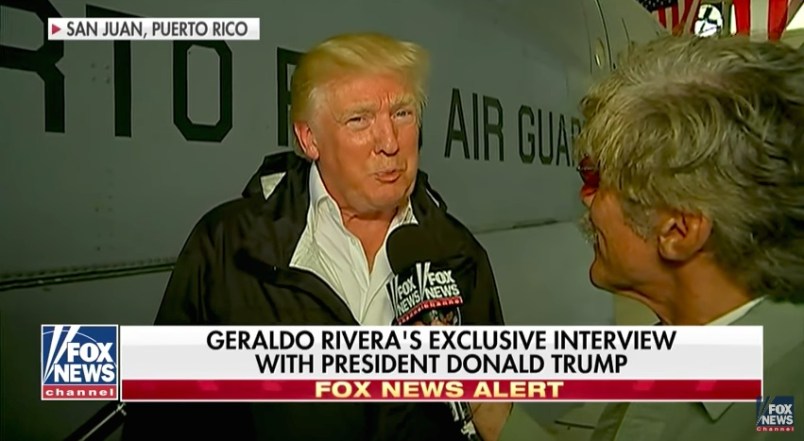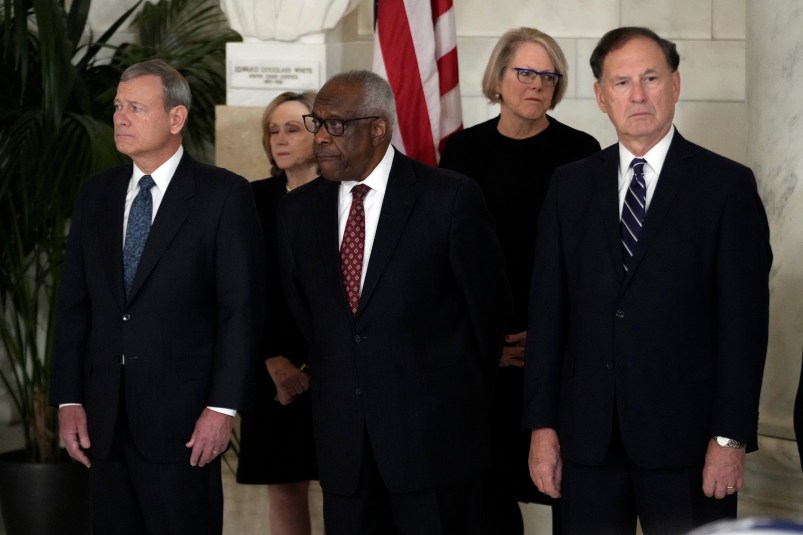Yesterday we were beguiled and aghast at President Trump’s awful and ridiculous comments in Puerto Rico. Soon enough though we’ll come back to what seems to be his major fixation: Puerto Rico’s public debt. Does President Trump own any of that debt? What about his family and associates? It’s not a crazy idea. We know very little about the President’s finances and assets. But I was curious about why it was such a focus of his even if he doesn’t stand to gain personally.
Then last night, he seemed to shift gears entirely, telling Geraldo Rivera that the government would “have to wipe that [debt] out” entirely. “You can say goodbye” to the existing debt no matter who takes a loss. He focused on “Goldman Sachs.” Was someone else talking to him? Was he just affected by what he saw? Was it all a show? Or will he just go back to his debt-punitive approach once he’s back? To this end, I was surprised to hear from TPM Reader RM that Commerce Secretary Wilbur Ross, a close associate and advisor of the President’s, was until quite recently the biggest shareholder and a board member of the company that is one of the biggest and most aggressive holders of the risk tied to Puerto Rico’s public debt.
Here’s the story.
Assured Guaranty is a company that provides insurance on government bonds among other services. If you buy bonds from a state or city you can insure against the risk of default or non-payment by insuring those bonds. If something goes wrong, a government or project defaults or misses a payment, your insurance kicks in and keeps you whole. Clear enough.
Let’s go back to early 2008.
The full credit crisis was still months in the future. But much of the squeeze was already coming into view. Wilbur Ross agreed to purchase a $250 million stake in AG and up to $750 million more at the company’s discretion. It was in essence of a substantial capitalization line of credit, to the tune of up to $1 billion.
You might think that AG was getting a bailout as the economy and markets began to go south. But that’s not it. AG was in the best position of the companies in this bond insurance space. Some competitors were in real trouble. It wasn’t a bailout. It was giving an additional capital advantage to the strongest of the pack with the expectation that other competitors would not survive the coming storm. AG would then be in a position to gobble up competitors and or market share as others struggled or failed.
That’s pretty much what happened over the next two years. As part of the initial purchase, Ross took a seat on AG’s board.
Not surprisingly, AG has major exposure to the distressed Puerto Rican bonds. Again, this is the business they’re in. According to a May 2017 article in The Wall Street Journal, AG has $5.4 billion in bond guarantees. It’s a lot. In May AG sued the federal oversight board set up to handle and untangle Puerto Rico’s debt crisis. The board had put Puerto Rico into what amounted to bankruptcy and AG was suing arguing that the board’s plan forced excessive losses on bondholders – the bondholders AG has to pay if Puerto Rico does not. We don’t have to get too deep into the particulars to understand the basic point. AG stands to lose vast amounts of money if bondholders are forced to take big ‘haircuts’ in the territory’s debt restructuring or default. And AG has been one of the most aggressive players on both the political and legal fronts to prevent that from happening.
Now, before we get too much further along, let’s address a key point. Ross no longer owns part of AG and he’s no longer on the board. At the end of 2014, Ross had to relinquish his board seat at AG to come into compliance with European Union regulations when he became Vice Chairman of the Bank of Cyprus. According to SEC records, he had sold off his shares in AG over the course of 2014. I assume that was in anticipation of taking up the Bank of Cyprus position. But that’s not clear. The relevant point is that by the end of 2014, as far as I can tell, Ross’s ownership stake and governance role in AG had come to an end. That’s over two years ago, long before Donald Trump became President and a good six months before he announced his campaign.
That means that at least in connection with AG, Ross appears to have no money on the line or conflict of interest with regards to Puerto Rico.
What interests me here however is that Ross must be highly versed on the Puerto Rican debt issue. He was until relatively recently the largest single owner and a board member of a company heavily exposed to any Puerto Rican debt default. That must color his views of the matter. One would assume that he’s highly sympathetic to the debt holders’ point of view. (It’s important to note that purchasing distressed companies, debt at pennies on the dollar is Ross’s business. So he probably doesn’t need much coloring or convincing.) He’s also a major advisor to the President on just these issues. Is Ross one of the reasons Trump was talking so much about this? I’d say there’s a pretty good chance of that. Will that color Trump’s attitudes on the question as he quite likely will make a number of policy decision tied to Puerto Rico’s public debt? Again, I’d say that’s pretty likely.
At least last night, President Trump was talking about completely zeroing out Puerto Rico’s public debt – something almost no one is talking about. The things being discussed are different modes of restructuring in which bondholders take more or less of a hit, restructuring plans in which the people of Puerto Rico don’t get crushed by debt they can’t hope to pay off without driving the territory into penury. And that was before the storm.
But President Trump also said he’d never cut Medicare, Medicaid or Social Security. He said that everyone would have better and cheaper coverage under Trumpcare. I hesitate to even call this lying since lying implies some conscious motive of deception which is distinct from telling the truth. It’s not exculpatory. But I don’t think Trump’s brain even works like that. I think he says whatever feels right in the moment or what he’s being told or thinks an audience wants to hear. If past experience is any guide, once he’s back in the White House, once he’s back talking to his hedge fund and private equity pals in late night phone conversations, he’ll come entirely back to their point of view. That’s the way everywhere policy question has played out so far.
That’s why we need to know a lot more about who’s advising Trump on the Puerto Rican debt front. What’s Wilbur Ross’s role? Who else is involved? What does Trump and his family stand to lose or gain on Puerto Rican debt? We don’t know the answers to any of these questions and we need to.







